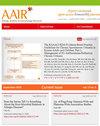Dupilumab对韩国未控制的中重度哮喘患者的影响:LIBERTY Asthma QUEST亚分析
IF 4.1
2区 医学
Q2 ALLERGY
引用次数: 2
摘要
目的评估dupilumab对LIBERTY asthma QUEST研究中韩国患者年化严重加重率、第一秒用力呼气量(FEV1)变化、总体哮喘控制和健康相关生活质量的影响。LIBERTY ASTHMA QUEST研究是一项针对dupilumab的3期、随机、双盲、安慰剂对照、平行组研究,纳入了1902例患者,其中74例(4%)为韩国患者。将患者随机分为4个治疗组(2:2:1:1)。本文报道的亚分析是对LIBERTY ASTHMA QUEST研究中4个原始治疗组的dupilumab和安慰剂合并组进行的。疗效终点是52周研究期间严重恶化事件的年化率和第12周支气管扩张剂前FEV1的基线变化。评估哮喘控制、哮喘生活质量和治疗对2型炎症生物标志物水平的影响。安全性也进行了评估。在韩国患者中,在52周的治疗期间,dupilumab (n = 49)比安慰剂(n = 25) (0.259 vs 1.942)降低了年化严重恶化率。dupilumab的相对风险降低率为87% (P < 0.001)。dupilumab治疗的患者在第12周支气管扩张剂前FEV1改善(平均差异为0.24 L, P = 0.021)。此外,观察到哮喘控制和哮喘相关生活质量的改善;血清免疫球蛋白E和FeNO水平降低。dupilumab组和安慰剂组的不良事件和严重不良事件发生率相当。dupilumab组共有11例患者报告了63例注射部位反应。结论:Dupilumab作为重症哮喘的附加治疗,在韩国患者中是有效的,并且具有可接受的安全性。临床试验注册:ClinicalTrials.gov标识符:NCT02414854本文章由计算机程序翻译,如有差异,请以英文原文为准。
Effect of Dupilumab in Korean Patients With Uncontrolled Moderate-to-Severe Asthma: A LIBERTY ASTHMA QUEST Sub-analysis
Purpose To assess the effect of dupilumab on the annualized severe exacerbation rates, change in forced expiratory volume at first second (FEV1), overall asthma control and health-related quality of life in Korean patients from the LIBERTY ASTHMA QUEST study. Methods Of the 1,902 patients enrolled in the LIBERTY ASTHMA QUEST study, a phase-3, randomized, double-blind, placebo-controlled, parallel-group study on dupilumab, 74 (4%) were Korean. The patients were randomly assigned to 4 treatment groups (2:2:1:1). The sub-analysis reported herewith was performed with the pooled groups of dupilumab and placebo from the 4 original treatment groups in the LIBERTY ASTHMA QUEST study. The efficacy endpoints were annualized rate of severe exacerbation events during the 52-week study period and changes from baseline in pre-bronchodilator FEV1 in week 12. Asthma control, asthma quality of life and the effect of treatment on the levels of type 2 inflammatory biomarkers were assessed. The safety profile was also evaluated. Results In Korean patients, annualized severe exacerbation rates were reduced with dupilumab (n = 49) compared to placebo (n = 25) (0.259 vs 1.942) during the 52-week treatment period. The relative risk reduction with dupilumab was 87% (P < 0.001). Improvements in pre-bronchodilator FEV1 (mean difference of 0.24 L, P = 0.021) were observed in week 12 in dupilumab-treated patients. Additionally, improvements in asthma control and asthma-related quality of life were observed; the FeNO and serum immunoglobulin E levels were reduced. The incidence of adverse events and serious adverse events was comparable between the dupilumab and placebo group. A total of 11 patients from the dupilumab group reported 63 injection site reactions. Conclusions Dupilumab, as an add-on therapy in severe asthma, is efficacious and has an acceptable safety profile in Korean patients. Trial Registration ClinicalTrials.gov Identifier: NCT02414854
求助全文
通过发布文献求助,成功后即可免费获取论文全文。
去求助
来源期刊

Allergy, Asthma & Immunology Research
ALLERGY-IMMUNOLOGY
CiteScore
6.10
自引率
6.80%
发文量
53
审稿时长
>12 weeks
期刊介绍:
The journal features cutting-edge original research, brief communications, and state-of-the-art reviews in the specialties of allergy, asthma, and immunology, including clinical and experimental studies and instructive case reports. Contemporary reviews summarize information on topics for researchers and physicians in the fields of allergy and immunology. As of January 2017, AAIR do not accept case reports. However, if it is a clinically important case, authors can submit it in the form of letter to the Editor. Editorials and letters to the Editor explore controversial issues and encourage further discussion among physicians dealing with allergy, immunology, pediatric respirology, and related medical fields. AAIR also features topics in practice and management and recent advances in equipment and techniques for clinicians concerned with clinical manifestations of allergies and pediatric respiratory diseases.
 求助内容:
求助内容: 应助结果提醒方式:
应助结果提醒方式:


